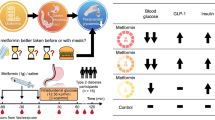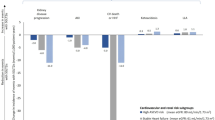Abstract
Purpose of the Review
This review aims to consolidate the latest knowledge on type 3c diabetes mellitus (T3cDM) and its management and pancreatic endocrine insufficiency (PEI) as a sequela, primarily focusing on two etiologies: pancreatitis and pancreatectomy.
Recent Findings
PEI is a consequence of pancreatogenic diabetes, a distinct type of diabetes mellitus also known as T3cDM. T3cDM develops secondary to diseases of the exocrine pancreas and has a unique pattern of metabolic and hormonal characteristics. Several exocrine pancreatic disorders and procedures including acute, relapsing, and chronic pancreatitis, pancreatic cancer, and pancreatectomy have been identified as underlying causes for the development of T3cDM.
Summary
Diagnosis of T3cDM is challenging as it is often misclassified as type 1 or type 2 DM due to overlapping clinical presentations. Management of T3cDM and the PEI sequela is likewise difficult due to the occurrence of several confounding metabolic dysfunctions and poor nutritional status. Treatment of pancreatic exocrine insufficiency is critical when managing patients with T3cDM.
Similar content being viewed by others
References
Papers of particular interest, published recently, have been highlighted as: • Of importance •• Of major importance
•• American Diabetes A. Diagnosis and classification of diabetes mellitus. Diabetes Care. 2012;35(Suppl 1):S64–71. https://doi.org/10.2337/dc12-s064. Official subclassification of T3cDM as pancreatogenic diabetes (association of T3cDM with the diseases of the exocrine pancreas)
American DA. Diagnosis and classification of diabetes mellitus. Diabetes Care. 2014;37(Suppl 1):S81–90. https://doi.org/10.2337/dc14-S081.
American Diabetes Association Professional Practice C. 2. Classification and diagnosis of diabetes: standards of medical care in diabetes-2022. Diabetes Care. 2022;45(Suppl 1):S17–38. https://doi.org/10.2337/dc22-S002.
Ewald N, Bretzel RG. Diabetes mellitus secondary to pancreatic diseases (Type 3c)–are we neglecting an important disease? Eur J Intern Med. 2013;24(3):203–6. https://doi.org/10.1016/j.ejim.2012.12.017.
Hart PA, Bradley D, Conwell DL, Dungan K, Krishna SG, Wyne K, et al. Diabetes following acute pancreatitis. Lancet Gastroenterol Hepatol. 2021;6(8):668–75. https://doi.org/10.1016/S2468-1253(21)00019-4.
Ewald N, Kaufmann C, Raspe A, Kloer HU, Bretzel RG, Hardt PD. Prevalence of diabetes mellitus secondary to pancreatic diseases (type 3c). Diabetes Metab Res Rev. 2012;28(4):338–42. https://doi.org/10.1002/dmrr.2260.
Valdez-Hernandez P, Perez-Diaz I, Soriano-Rios A, Gomez-Islas V, Garcia-Fong K, Hernandez-Calleros J, et al. Pancreatogenic diabetes, 2 onset forms and lack of metabolic syndrome components differentiate it from type 2 diabetes. Pancreas. 2021;50(10):1376–81. https://doi.org/10.1097/MPA.0000000000001930.
• Narayanan S, Bhutiani N, Adamson DT, Jones CM. Pancreatectomy, islet cell transplantation, and nutrition considerations. Nutr Clin Pract. 2021;36(2):385–97. https://doi.org/10.1002/ncp.10578. Key paper to highlight and consolidate information on perioperative nutritional aspects in patients undergoing total pancreatectomy and islet transplantation.
Conlon KC, Duggan SN. Pancreatogenic type 3c diabetes: underestimated, underappreciated and poorly managed. Practical Gastroenterol. 2017;15
•• Ewald N, Hardt PD. Diagnosis and treatment of diabetes mellitus in chronic pancreatitis. World J Gastroenterol. 2013;19(42):7276–81. https://doi.org/10.3748/wjg.v19.i42.7276. First paper to recommend diagnostic criteria for T3cDM
Gudipaty L, Rickels MR. Pancreatogenic (type 3c) diabetes. Pancreapedia 2015.
Cui Y, Andersen DK. Pancreatogenic diabetes: special considerations for management. Pancreatology. 2011;11(3):279–94. https://doi.org/10.1159/000329188.
Sliwinska-Mosson M, Bil-Lula I, Marek G. The cause and effect relationship of diabetes after acute pancreatitis. Biomedicines 2023;11(3):667
Hart PA, Bellin MD, Andersen DK, Bradley D, Cruz-Monserrate Z, Forsmark CE, et al. Type 3c (pancreatogenic) diabetes mellitus secondary to chronic pancreatitis and pancreatic cancer. Lancet Gastroenterol Hepatol. 2016;1(3):226–37. https://doi.org/10.1016/S2468-1253(16)30106-6.
Wynne K, Devereaux B, Dornhorst A. Diabetes of the exocrine pancreas. J Gastroenterol Hepatol. 2019;34(2):346–54. https://doi.org/10.1111/jgh.14451.
Lankisch PG, Apte M, Banks PA. Acute pancreatitis. Lancet. 2015;386(9988):85–96. https://doi.org/10.1016/S0140-6736(14)60649-8.
Zhi M, Zhu X, Lugea A, Waldron RT, Pandol SJ, Li L. Incidence of new onset diabetes mellitus secondary to acute pancreatitis: a systematic review and meta-analysis. Front Physiol. 2019;10:637. https://doi.org/10.3389/fphys.2019.00637.
Cho J, Scragg R, Petrov MS. Risk of mortality and hospitalization after post-pancreatitis diabetes mellitus vs type 2 diabetes mellitus: a population-based matched cohort study. Am J Gastroenterol. 2019;114(5):804–12. https://doi.org/10.14309/ajg.0000000000000225.
•• Das SL, Singh PP, Phillips AR, Murphy R, Windsor JA, Petrov MS. Newly diagnosed diabetes mellitus after acute pancreatitis: a systematic review and meta-analysis. Gut. 2014;63(5):818–31. https://doi.org/10.1136/gutjnl-2013-305062. Critical work to link AP disease severity to occurrence of DM after AP episodes
Shen HN, Yang CC, Chang YH, Lu CL, Li CY. Risk of diabetes mellitus after first-attack acute pancreatitis: a national population-based study. Am J Gastroenterol. 2015;110(12):1698–706. https://doi.org/10.1038/ajg.2015.356.
Vipperla K, Papachristou GI, Slivka A, Whitcomb DC, Yadav D. Risk of new-onset diabetes is determined by severity of acute pancreatitis. Pancreas. 2016;45(1):e14–5. https://doi.org/10.1097/MPA.0000000000000536.
Uomo G, Gallucci F, Madrid E, Miraglia S, Manes G, Rabitti PG. Pancreatic functional impairment following acute necrotizing pancreatitis: long-term outcome of a non-surgically treated series. Dig Liver Dis. 2010;42(2):149–52. https://doi.org/10.1016/j.dld.2009.08.007.
Tu J, Zhang J, Ke L, Yang Y, Yang Q, Lu G, et al. Endocrine and exocrine pancreatic insufficiency after acute pancreatitis: long-term follow-up study. BMC Gastroenterol. 2017;17(1):114. https://doi.org/10.1186/s12876-017-0663-0.
• Liu C, Shi Q, Zhang X, Xue E, Li H, Wang W. Incidence and risk factors of fasting hyperglycaemia following first-attack acute pancreatitis before discharge: a retrospective study. BMC Gastroenterol. 2023;23(1):203. https://doi.org/10.1186/s12876-023-02775-7. New paper to evaluate possible risk factors of fasting hyperglycemia following first-attack AP; showed age ≥ 60 years and triglyceride level of ≥ 5.65 mmol/L were independent risk factors
•• O'Brien SJ, Omer E. Chronic pancreatitis and nutrition therapy. Nutr Clin Pract. 2019;34(Suppl 1):S13–S26. https://doi.org/10.1002/ncp.10379. Critical and comprehensive review in managing nutritional dysfunction in CP patients
Hart PA, Kudva YC, Yadav D, Andersen DK, Li Y, Toledo FGS, et al. A reduced pancreatic polypeptide response is associated with new-onset pancreatogenic diabetes versus type 2 diabetes. J Clin Endocrinol Metab. 2023;108(5):e120–8. https://doi.org/10.1210/clinem/dgac670.
Sasikala M, Talukdar R, Subramanyam C, Nageshwar RD. The enigma of type 3c diabetes in chronic pancreatitis. Pancreas Open J. 2016;1(2):19–21.
Hardt PD, Krauss A, Bretz L, Porsch-Ozcurumez M, Schnell-Kretschmer H, Maser E, et al. Pancreatic exocrine function in patients with type 1 and type 2 diabetes mellitus. Acta Diabetol. 2000;37(3):105–10. https://doi.org/10.1007/s005920070011.
•• Makuc J. Management of pancreatogenic diabetes: challenges and solutions. Diabetes Metab Syndr Obes. 2016;9:311–5. https://doi.org/10.2147/DMSO.S99701. Comprehensive summary and evaluation of literature towards the management of T3cDM
Downs EM, Eaton A, Witkowski P, Wijkstrom M, Walsh M, Trikudanathan G, et al. Nutritional risks in patients undergoing total pancreatectomy islet autotransplantation in the POST consortium. J Gastrointest Surg. 2023;27(9):1893–902. https://doi.org/10.1007/s11605-023-05770-1.
Witkowski P, Savari O, Matthews JB. Islet autotransplantation and total pancreatectomy. Adv Surg. 2014;48:223–33. https://doi.org/10.1016/j.yasu.2014.05.006.
Tian X, Ma Y, Gao H, Zhuang Y, Yang Y. Surgical options for control of abdominal pain in chronic pancreatitis patients. J Pain Res. 2019;12:2331–6. https://doi.org/10.2147/JPR.S208212.
Kleeff J, Whitcomb DC, Shimosegawa T, Esposito I, Lerch MM, Gress T, et al. Chronic pancreatitis. Nat Rev Dis Primers. 2017;3:17060. https://doi.org/10.1038/nrdp.2017.60.
Wu L, Nahm CB, Jamieson NB, Samra J, Clifton-Bligh R, Mittal A, et al. Risk factors for development of diabetes mellitus (Type 3c) after partial pancreatectomy: a systematic review. Clin Endocrinol (Oxf). 2020;92(5):396–406. https://doi.org/10.1111/cen.14168.
Jethwa P, Sodergren M, Lala A, Webber J, Buckels JA, Bramhall SR, et al. Diabetic control after total pancreatectomy. Dig Liver Dis. 2006;38(6):415–9. https://doi.org/10.1016/j.dld.2006.01.022.
Andersen DK. Management of endocrine failure in chronic pancreatitis. Pancreapedia. 2016. https://doi.org/10.3998/panc.2016.6.
•• Sutherland DE, Radosevich DM, Bellin MD, Hering BJ, Beilman GJ, Dunn TB, et al. Total pancreatectomy and islet autotransplantation for chronic pancreatitis. J Am Coll Surg. 2012;214(4):409–24; discussion 24–6. https://doi.org/10.1016/j.jamcollsurg.2011.12.040. Seminal paper on the outcomes of TPIAT
• Rickels MR, Robertson RP. Pancreatic Islet transplantation in humans: recent progress and future directions. Endocr Rev. 2019;40(2):631–68. https://doi.org/10.1210/er.2018-00154. Important review on human islet transplantation
Johnston PC, Lin YK, Walsh RM, Bottino R, Stevens TK, Trucco M, et al. Factors associated with islet yield and insulin independence after total pancreatectomy and islet cell autotransplantation in patients with chronic pancreatitis utilizing off-site islet isolation: Cleveland Clinic experience. J Clin Endocrinol Metab. 2015;100(5):1765–70. https://doi.org/10.1210/jc.2014-4298.
Narayanan S, Loganathan G, Dhanasekaran M, Tucker W, Patel A, Subhashree V, et al. Intra-islet endothelial cell and beta-cell crosstalk: implication for islet cell transplantation. World J Transpl. 2017;7(2):117–28. https://doi.org/10.5500/wjt.v7.i2.117.
Dominguez-Munoz JE, Phillips M. Nutritional therapy in chronic pancreatitis. Gastroenterol Clin North Am. 2018;47(1):95–106. https://doi.org/10.1016/j.gtc.2017.09.004.
•• Chinnakotla S, Bellin MD, Schwarzenberg SJ, Radosevich DM, Cook M, Dunn TB, et al. Total pancreatectomy and islet autotransplantation in children for chronic pancreatitis: indication, surgical techniques, postoperative management, and long-term outcomes. Ann Surg. 2014;260(1):56–64. https://doi.org/10.1097/SLA.0000000000000569. Seminal paper on outcomes of pediatric TPIAT
• Swauger SE, Hornung LN, Elder DA, Balamurugan AN, Vitale DS, Lin TK, et al. Predictors of glycemic outcomes at 1 year following pediatric total pancreatectomy with islet autotransplantation. Diabetes Care. 2022;45(2):295–302. https://doi.org/10.2337/dc21-1222. Novel article on glucose management in the immediate and early (1year) phase post TPIAT in children
Tellez SE, Hornung LN, Courter JD, Abu-El-Haija M, Nathan JD, Lawson SA, et al. Improved Glycemic outcomes with early initiation of insulin pump therapy in pediatric postoperative total pancreatectomy with islet autotransplantation. J Clin Med. 2021. https://doi.org/10.3390/jcm10112242.
• Tellez S, Hornung L, Abu-El-Haija M, Elder D. Metabolic outcomes in pediatric patients one-year post-total pancreatectomy with islet autotransplantation after early pump initiation. J Clin Med. 2023. https://doi.org/10.3390/jcm12093319. Novel article on glucose management in the immediate and early (1year) phase post TPIAT in children
Tellez SE, Hornung LN, Vitale DS, Lawson SA, Abu-El-Haija MA, Elder DA. Endocrine management and clinical outcomes in a cohort of pediatric patients undergoing total pancreatectomy with Islet autotransplantation. Diabetes Technol Ther. 2023;25(11):800–7. https://doi.org/10.1089/dia.2023.0243.
Funding
The authors did not receive support from any organization for the submitted work.
Author information
Authors and Affiliations
Contributions
SN analyzed the literature, collected the data, and wrote the initial draft of the manuscript. CW and JT helped in collecting the data and edited the manuscript. YAS and CMJ provided framework for the study, reviewed, and edited the manuscript. All authors read and agreed to the final version of the manuscript.
Corresponding author
Ethics declarations
Conflict of interest
All authors have nothing to disclose.
Human and Animal Rights and Informed Consent
No animal or human subjects by the authors were used in this study.
Additional information
Publisher's Note
Springer Nature remains neutral with regard to jurisdictional claims in published maps and institutional affiliations.
Rights and permissions
Springer Nature or its licensor (e.g. a society or other partner) holds exclusive rights to this article under a publishing agreement with the author(s) or other rightsholder(s); author self-archiving of the accepted manuscript version of this article is solely governed by the terms of such publishing agreement and applicable law.
About this article
Cite this article
Narayanan, S., Wayne, C.D., Tharmalingam, J. et al. Pancreatic Endocrine Insufficiency. Curr Surg Rep 12, 52–57 (2024). https://doi.org/10.1007/s40137-024-00389-w
Accepted:
Published:
Issue Date:
DOI: https://doi.org/10.1007/s40137-024-00389-w




